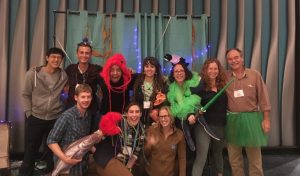A few thoughts following the 100th meeting of the Western Society of Naturalists
Monterey, CA; 11-13 November 2016
Photo: A few of the past and present Raimondi-Carr Lab members at WSN 2016.

NATURAL HISTORY
Two of the invited talks from WSN stand out to me. First, Jackie Sones won this year’s Naturalist of the Year and gave an inspiring speech on the study of natural history. A lifelong naturalist, Jackie discussed ways that she inspires others through her love of nature. Second, Jim Estes gave the closing keynote at the 100th anniversary of the Western Society of Naturalists. He used stories to discuss his serendipitous career in marine ecology. After the meeting, I’m still thinking about two things he said. Jim – a highly respected figure in ecology – told nascent ecologists that our science does not need to be hypothesis driven. I’ll repeat that. We don’t need to have hypotheses going into every study that we do! As someone who often learns best through simple observation, this was so reassuring. This doesn’t mean to me that hypotheses aren’t important for structuring science, simply that there is more than one path to discovery. He also made the point that the study of natural history is an amorphous thing. Natural history doesn’t have to simply mean being an expert in the taxonomy of organisms. Being in nature, observing and internalizing patterns and processes is also natural history. As always, I walk away from WSN with a renewed motivation to spend time in nature, watching and learning from ecology in action.
SHARING IDEAS
Imposter Syndrome has a perhaps too-close-to-home meaning for many graduate students. Like many, I go through periods of doubting my own ideas, interests and conclusions. However, the meeting of ecologists in Monterey this weekend helped to assuage these doubts. I met a recent faculty hire who is thinking about some of the same pelagic-nearshore marine connectivity questions that I’ve been thinking about for years. This seems minor, but was surprisingly affirming. So affirming, that I’m now considering writing a synthesis about what we know and don’t know on the topic!
100 YEARS
100 years is a long time! This society has promoted the study of natural history on the West coast, and members have been incredibly influential in shaping the larger field of ecology. I now find myself grappling with what I think the future of the Western Society of Naturalists should be. I think that maintaining a focus on natural history (in an era when mathematical models and global syntheses often fill top journals) is essential. To lose this focus and the inspiration that it gives to me would be a shame. But, what else could the future of WSN look like? Could the society use its large, influential membership to encourage diversity in ecology (more on this below), encourage open and reproducible science, or shape relevant marine policy? Faced with collapsing fisheries, large-scale coastal habitat degradation and difficult decisions regarding marine use, should WSN continue to shy away from advocacy? I’m not sure how this would look (and certainly acknowledge that advocacy from respected scientists is risky), but I’m now pondering if there are issues today that warrant this risk.
WOMEN IN ECOLOGY
As part of the 100th anniversary celebration, President Jay Stachowicz solicited recommendations and votes for the 100 most influential papers in the field of ecology to-date. On Saturday night, he presented the results, and the top papers are all certainly deserving of accolade. However, I came away from the presentation deflated. Not a single paper discussed was first-authored by a woman. While I understand that we can’t change the history of the sciences (few women, dominated by rich white men), we can make a conscious effort not to overlook contributions made by women now (how were Jane Lubchenco’s papers not mentioned?!). I am disappointed that Dr. Stachowicz didn’t think to acknowledge that men may have been the history of the field, but that moving forward and tackling the wicked ecological problems of today will take a much more diverse set of minds, including the minds of the many women in ecology.
** WSN 2017 – Pasadena, CA **